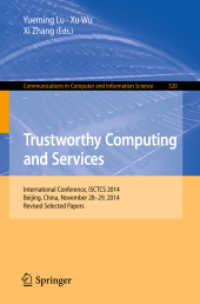- ホーム
- > 洋書
- > 英文書
- > History / World
Full Description
This primary source reader covers the entire span of ancient history, providing helpful editorial material and carefully selected sources. The selections in this text encourage critical thinking through an examination of parallel developments across ancient civilizations during the same historical periods.
Contents
Each Part concludes with selected background reading. Part IEASTERN CIVILIZATIONS. Foundation Epics. 1. The Epic of Gilgamesh: The Sumerian Heroic Age: A. The Quest of Gilgamesh: "who is most splendid among the heroes?"; B. The Epic of the Flood: The Babylonian Noah. 2. Hebrew Bible: Earliest Relations Between Humans and God. Early Society, Justice and Moral Order. 3. The Shamash Hymns: Moral Religion and Social Justice. 4. The Laws of Hammurabi: "To further the welfare of the people." 5. The Instruction of Ptah-hotep: Early Material Values in Egypt. Social and Work Life. 6. Work Songs from Ancient Egypt: Voices of Ordinary Men and Women. 7. School Days in Sumer: "all the fine points of the scribal art." Divine Worship, Kingship and Nation. 8. Unas Pyramid Incantations: The Afterlife of a Pharaoh. 9. Hymn to the Aton: Religious Reform and Monotheism. 10. God and the Early Hebrews: A. The Patriarchs; B. Bondage and Deliverance; C The Sinai Covenant; D. The People Demand a King: "To govern us like all the nations"; E. The United Kingdom of Israel: "A great name, like the name of the great ones of the earth"; F. Jeremiah: Prophet of the New Covenant. War and International Diplomacy. 11. Amarna Letters: a Brotherhood of Kings. 12. An Egyptian-Hittite Treaty: Imperialism and International Diplomacy. 13. Sea Peoples' Inscriptions: Egypt and Its Neighbors Under Ramses III: A. Ramses III Issuing Equipment to His Troops for the Campaign Against the Sea Peoples; B. Ramses III on the March to Zahi Against the Sea Peoples; C. Ramses III in Battle with the Land Forces of the Sea Peoples. 14. Prism of Sennacherib: An Assyrian King's Wars. Persia: the Last Ancient Near Eastern Empire. 15. A Conquering Messiah: Cyrus the Great and the Persian Empire: A. Cyrus' Cylinder: The Chosen of Marduk; B. Cyrus as the Messiah: Return of the Jews and the Rebuilding of Jerusalem. Part II: GREEK CIVILIZATION: ANCIENT GREECE. Foundation Stories: Gods, Heroes and the Individual. 16. Homer: The Greek Heroic Age. 17. Hesiod: Changing Times and the Moral Order. 18. Early Greek Lyric Poetry: Individualism Emergent: A. Sappho; B. Theognis. 19. Pindar's Odes to Athletic Victors: The Heroic Ideal. Archaic Greek City-States, Colonization and Tyranny. 20. Herodotus: The Foundation of Cyrene in Libya. 21. Lycurgus: The Spartan Military Machine. 22. Solon: Economic and Political Reforms at Athens. 23. Pisistratus: The Rise of Tyranny at Athens. War and Peace in the Classical Age. 24. Herodotus: Greece Saved from Persian Conquest. 25. Pericles' Funeral Oration: An Idealized View of Athenian. Democracy and Its Empire. 26. The Old Oligarch: A Critical View of Athenian Democracy and Its Empire. 27. Thucydides, History: The Statesman's Handbook: A. The Revolt of Mitylene: "Democracy is incapable of empire"; B. The Corcyrean Revolution: The Psychology of Civil War; C. The Melian Dialogue: "The strong do what they can and the weak submit"; D. The Sicilian Expedition: "Most glorious to the victors, most calamitous to the conquered." Society, Culture and Intellectual Life. 28. Lysias, The Murder of Eratosthenes: An Athenian Woman's Life: "...I began to trust her..." 29. Euripides, Medea: Greek Tragic Vision of Women and the City. 30. Socrates: Philosophy Shifts from Nature to Man: A. The Socratic Method: "The unexamined life is not worth living"; B. Aristophanes, Clouds: Socrates as Troublemaker: "You will now believe in no god but those we believe in..."; C. The Apology of Socrates: "I am that gadfly which God has attached to the state." 31. Plato: "Turning the eye of the soul toward the light": A. The Theory of Ideas: The Allegory of the Cave; B. The Spiritual Life: Dualism of Body and Soul. 32. Aristotle, Nicomachean Ethics: "The philosophy of human affairs": A. The Subject of the Nicomachean Ethics: "The good for man"; B. The Definition of Happiness; C. Intellectual and Moral Virtue. 33. Aristotle, Politics: "A state exists for the sake of the good life": A. Nature, Origin, and Purpose of the State; B. Good and Bad Constitutions; C. The Ideal State: Its True Object; D. The Ideal State: Education; E. The Practicable State: The Best Constitution; F. The Practicable State: Causes of Revolution; G. The Practicable State: Preserving Constitutions. Late Classical Greece. 34. Demosthenes Versus Isocrates: "Nationalism" Versus "Internationalism": A. Demosthenes, First Philippic: "Athenians, when will you act as becomes you!"; B. Isocrates, Address to Philip: "A champion powerful in action." Part III: HELLENISTIC CIVILIZATION. From Warrior Kings to Divine Rulers 35. Arrian, History of Alexander the Great: Conqueror and Reformer: "We are free men, and they are slaves..." 36. Demetrius: A God Among Men: A. Plutarch, Life of Demetrius; B. Athenaeus, The Learned Banquet: Ithylphallic Hymn in Honor of Demetrius. 37. Euhemerus of Messene, Sacred History: How Men Became Gods. Hellenistic Rulers and Their Subjects. 38. Antigonus the One-Eyed and Scepsis: "that Antigonus may receive honours worthy of his achievements...": A. Letter of Antigonus to Scepsis; B. Scepsis' Response to Antigonus' Letter. 39. Athenaeus, The Learned Banquet: Hellenistic Pomp and Circumstance: "What monarchy ... has ever been so rich in gold?" Hellenistic Culture, Economy and Thought. 40. Rosetta Stone Inscription: "Ptolemy the everliving, beloved of Ptah." 41. Papyri on Greek and Non-Greek Interactions: "I do not know how to speak Greek." 42. Oil Monopoly of Ptolemy II Philadelphus: Toward a Command Economy: "...exact payment from them..." 43. Hellenistic Philosophy: Greek Thought in a Wider World: A. The Cynic Counterculture: "may I consider the universe my house"; B. Stoics and their Worldview: "the wise man does all things well." 44. Hellenistic Science: Archimedes The Limits of Hellenism. 45. Polybius, Histories: Rome and the Hellenistic Kings: "he drew a circle round Antiochus..." 46. First and Second Maccabees: Jewish Responses to Hellenization: A. First Maccabees: Jewish Welcome Roman Power: "they were very strong ..."; B. Second Maccabees: "The altar was covered with abominable offerings..." 47. Plutarch, The Life of Antony: The Portrait of Queen Cleopatra: "... putting her greatest confidence in herself ..." Part IV: THE ROMAN REPUBLIC. Traditions on Early Rome. 48. Livy: The Early Romans: "The kind of lives our ancestors lived": A. Preface: "The greatest nation in the world"; B. The Rape of Lucretia: Monarchy Abolished; C. Horatius at the Bridge: "A noble piece of work." Rome as a Rising Power. 49. Livy: The Foreign Policy of the Roman Republic: "One people in the world which would fight for others' liberties." 50. Polybius: The Constitution of the Roman Republic: "it is impossible to find a better." 51. Cato the Elder: Traditional Standards in a New Age. 52. Pseudo-Cicero: How to Get Elected to Public Office in Rome: "You must take pains to solicit the votes of all these men ..." Crises and Transformations. 53. Tiberius Gracchus: The Republic at the Crossroads. 54. Gaius Gracchus: The Republic at the Crossroads, Continued. 55. The Social War: Rome's Italian Allies in Revolt: "they considered it no longer tolerable." 56. The Revolt of Spartacus: The Dangers of a Slave Society: "... the slaves leaped and began to fight..." 57. The Conspiracy of Catiline: The Roman Republic in Decay. Intellectual Life and Culture. 58. Lucretius: Epicurean Philosophy at Rome. 59. Cicero: Advocate of Property Rights, Greek Philosophy, and the Status Quo. Late Republic and the Rise of Autocracy. 60. Appian: First Roman Civil War and Proscriptions: "... destruction, death, confiscation, and wholesale extermination." 61. Julius Caesar: The Man and the Statesman: "He doth bestride the narrow world like a colossus." 62. Cicero as Champion of Liberty: The Second Philippic: "An eloquent man who loved his country well." Part V: THE ROMAN EMPIRE. Foundations of the Principate. 63. Augustus: The Achievements of the Deified Augustus: "... attained supreme power by universal consent." 64. Augustus' Reconstruction of the Roman World: Contrasting Estimates: A. Dio Cassius: The "True Democracy" of the Roman Empire; B. Tacitus, Annals: "It was really from a lust for power"; C. Vergil, Aeneid: A Roman National Epic: "behold this nation." Romans and Non-Romans in the Pax Romana. 65. The Pax Romana: Divergent Views: A. Tacitus, Histories: "By the prosperity and order of eight hundred years has this fabric of empire been consolidated"; B. Tacitus, Agricola: "They create a desert and call it peace"; C. Aelius Aristides, Oration on Rome: "How is this form of government not beyond every democracy?" 66. Tacitus: The Early Germans. 67. Claudius' Letter to the Alexandrians: Greeks, Jews and Romans: "a solicitude of very long standing for the city." 68. Rebels Against Rome: A. Tacitus, Annals: The Rebellion of Boudicca in Britain: "This is what I, a woman, plan to do!"; B. Josephus, History of the Jewish War: Resistance is Futile: "So there is no refuge left except to make God your ally." 69. Pliny's Correspondence with Trajan: Rome as Benevolent Ruler: "worthy of ... the splendor of your reign." Women, Family, and Roman Slave Society. 70. The Legal Status of Roman Women. 71. Juvenal, Satires: The Emancipated Women of the Early Empire. 72. Aspects of Roman Slavery: A. Varro, On Agriculture: Setting Up a Slave Plantation: "Slaves should be neither cowed nor high-spirited"; B. Columella, On Agriculture: Masters and Slaves: "Their unending toil was lightened by such friendliness ..."; C. Seneca, Moral Epistle: "...see in him a freeborn man..."; D. Petronius, Satyricon: Banquet of Trimalchio, Ex-Slave and Self-Made Millionaire. Philosophy and Religion. 73. Marcus Aurelius, Meditations: "Either atoms or Providence." 74. Apuleius, Golden Ass: The Cult of Isis and Religious Syncretism. Part VI: EARLY CHRISTIANITY AND LATE ANTIQUITY. Christian Origins. 75. The New Testament: The Beginnings of Christianity: A. The Teachings of Jesus: "Turn away from your sins! The Kingdom of heaven is near!"--1. John the Baptist and the Sermon on the Mount, 2. Parables of the Kingdom, 3. Jesus' Instructions to His Disciples; B. The Work of Paul: "Jews and Gentiles...are all one in union with Christ Jesus."--1. Paul's Mission: Failure at Athens, Success at Corinth, 2. Paul's Epistles to Christian Communities. Christianity and Its Reception in the Roman World. 76. Christianity and Greco-Roman Thought: "Whatever has been uttered aright by any men in any place belongs to us Christians": A. Justin Martyr, Apology: "Those who lived according to reason are Christians"; B. Tatian, Address to the Greeks: "do not resolve your gods and myths into allegories"; C. Tertullian, Against Heretics: "What is there in common between Athens and Jerusalem?" 77. Christians and Their Persecutors: "Amid the ruins of a falling age, our spirit remains erect": A. Pliny, Letters on Christians: Trajan's Enlightened Policy; B. Martyrdom of Polycarp of Smyrna: "I am a Christian"; C. Tertullian, Apology: A Christian View of the Persecutions. A New Roman Empire. 78. The Reforms of Diocletian: "...by whose virtue and foreseeing care all is being reshaped for the better": A. Administrative Reorganization: "This man...overturned the Roman Empire"; B. Edict of Maximum Prices: Fighting Inflation in the Late Roman Empire; C. Diocletian's Edict of Persecution Against Christians: "There are profane persons here..." 79. Lactantius, On the Deaths of the Persecutors: "This man ... overturned the Roman Empire." 80. Eusebius of Caesarea, Life of the Emperor Constantine: "Serving God ... with his every action." 81. Athanasius, Life of Anthony: Ascetic as Holy Man and Celebrity: "...they saw that even demons feared Antony." 82. John Chrysostom, On the Priesthood: Ascetic as Bishop: "... the exceeding sanctity of this office ..." 83. The Theodosian Code: Legislating a Christian Roman Empire. New Crises and "Fall of the Roman Empire." 84. Jerome, Letter: Lament on Rome: "The world sinks into ruin ..." 85. Augustine, City of God: The Unimportance of the Earthly City: "The fire which makes gold shine makes chaff smoke." 86. Augustine, Confessions: "How did I burn to fly from earthly things to You." 87. Salvian of Marseille, On the Governance of God: "Where or in whom are evils so great, except among the Romans?"








